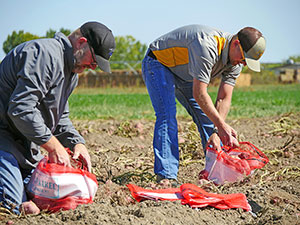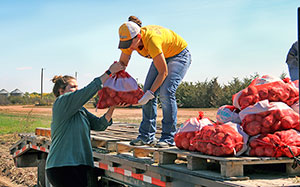UW, Collaborators Help Donate Tons of Potatoes to Food Bank of Wyoming
Published October 04, 2021

More than 3 tons of potatoes are being distributed across Wyoming this fall in a project that started in a University of Wyoming research field near Lingle.
The project is a collaboration among the James C. Hageman Sustainable Agriculture Research and Extension Center (SAREC), the Cent$ible Nutrition Program (CNP) and Food Bank of Wyoming.
A group of volunteers, including cadets from the Wyoming Cowboy Challenge Academy (WCCA), harvested the potatoes Friday, Sept. 24, near Lingle. More than 6,490 pounds of potatoes were bagged in four hours, which Food Bank of Wyoming picked up that afternoon.
“What we are doing today is using some of the excess potatoes that we typically have, and we’re going to be donating these to Food Bank of Wyoming,” says Brian Lee, an agricultural economist and an associate research scientist at SAREC.
Food Bank of Wyoming has made the potatoes available to food pantries around the state.
“We are going to put the potatoes on our mobile pantries and give them to our partner pantries around the state,” says Tony Woodell, Food Bank of Wyoming director. “This is a great gift, and we look forward to sharing it around the state.”
Food Bank of Wyoming seeks to ignite the power of community to nourish people facing hunger.
“This is a great illustration of that,” Woodell says. “We are collaborating with communities, with growers and with partners.”
Mindy Meuli, CNP director, echoes this. CNP is housed in the College of Agriculture and Natural Resources.
“It is exciting to partner with SAREC because of the large crop of potatoes that could feed many people in Wyoming,” she says.
SAREC grows a variety of crops for research, including potatoes. One of the fields of potatoes is used for an outreach program with local elementary school students. Elementary students from local communities come to SAREC, where they learn about growing potatoes.
“Then, we come out to the field and let the students have a chance to dig and also bag potatoes that they can take home,” Lee says.
Lee reached out to Meuli in late 2019 about extra potatoes from the project and donating them to support food security efforts in the state.
In 2020, COVID-19 stopped the donation, but the pieces came together this year.
“We thought it was an obvious collaboration (between CNP and SAREC) that should happen,” Lee says. “So, Mindy helped coordinate with the food bank and the Challenge Academy and other UW personnel to make this happen.”
WCCA is an accredited special purpose school based in Guernsey. The school works with nontraditional learners to help them earn high school credits in a quasi-military environment, where they learn leadership and coping skills as well as the value of giving back to their communities.
Cadets complete 40 hours of service to the community as part of WCCA’s graduation requirements.
Community projects offer cadets different experiences, says Deidra Wilson, an English teacher at WCCA, who also attended the harvest.
“I think a lot of the community service they do gives them different aspects of what job life looks like. It’s a good way to give them chances to try something they’ve never tried before,” Wilson says.
For Ethan Smither, a cadet returning to Wyoming from Illinois, the harvest day provided a sense of familiarity.

“I’ve worked on a farm, so it feels natural for me,” Smither says.
The work also feeds into his interest for the future.
“After Challenge Academy, I plan to go to the Airborne Rangers in the Army. And then, after that, I’m going to try to start my own ranch, my own farm,” he says, adding that he wants to stay in Wyoming.
Staff members from SAREC, UW Extension and CNP joined the WCCA cadets to harvest the potatoes. Before the arrival of volunteers, the potatoes were dug up with equipment and laid on the open ground. The group of volunteers moved along the rows, picking out undamaged potatoes to bag. Bags were then loaded onto a flatbed trailer to be weighed before loading onto pallets to go in the Food Bank of Wyoming truck.
“One thing potatoes are really good at is feeding people,” says Lee, who notes potatoes store well, making their shelf life longer than many fresh produce items.
Concerns over shelf life are one of the challenges of providing fresh produce, according to Woodell.
“Any time we can provide produce to individuals, the nutritional value is high,” Woodell says. “The shelf life is usually short so, therefore, to procure produce through local sources extends the shelf life because there is less transportation involved. Local produce allows people to have nutritious foods on their tables. At the end of the day, that’s what we’re all about.”
While this is the first time SAREC, Food Bank of Wyoming and CNP have collaborated, Meuli says she hopes this is just the beginning of a strong partnership.
“I hope to see more opportunities for UW research and extension centers to find ways to support local food pantries and food security efforts in the state,” she says.
The local nature of this partnership is part of what makes it special.
“Everyone is excited to get a Wyoming product for Wyoming people who are facing hunger. We just want to say thank you to SAREC for providing the potatoes, and we look forward to future partnerships,” Woodell says.
Information about potatoes and recipes is available through local CNP offices.

